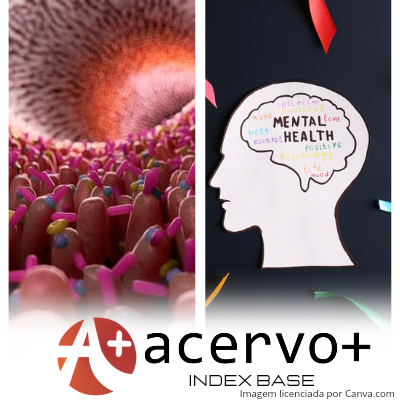Microbiota intestinal e seu papel na saúde mental
##plugins.themes.bootstrap3.article.main##
Resumo
Objetivo: Avaliar a eficácia de intervenções com probióticos, prebióticos e dieta na melhoria dos sintomas de transtornos mentais, como depressão e ansiedade, e seu impacto na vida dos pacientes. Métodos: Revisão integrativa da literatura realizada nas bases PubMed, CAPES e BVS, usando os descritores "Mental Disorders", "Gut Microbiota" e "Probiotics" e obtendo o truncamento de pesquisa: (Critical Care) AND (Intensive Care Units) AND (Surgical Procedures, Operative) AND (Patient Monitoring). Foram incluídos 18 artigos dos últimos 5 anos, excluindo-se estudos que não atendiam ao objetivo da pesquisa. Resultados: Evidências sugerem que dietas e probióticos podem influenciar a saúde mental, principalmente pela modulação da microbiota intestinal. Intervenções probióticas mostraram potencial para melhorar sintomas de depressão e ansiedade, reduzindo inflamações e modulando o eixo intestino-cérebro. No entanto, os resultados variam devido a limitações, como a falta de padronização e a curta duração dos estudos. A eficácia é promissora, mas mais pesquisas são necessárias para confirmar efeitos a longo prazo e entender melhor os mecanismos subjacentes. Considerações finais: Probióticos têm potencial terapêutico na saúde mental, especialmente em casos de depressão e ansiedade, ao melhorar a microbiota intestinal e reduzir inflamações. No entanto, são necessárias mais pesquisas para padronizar dosagens e entender lacunas.
##plugins.themes.bootstrap3.article.details##
Copyright © | Todos os direitos reservados.
A revista detém os direitos autorais exclusivos de publicação deste artigo nos termos da lei 9610/98.
Reprodução parcial
É livre o uso de partes do texto, figuras e questionário do artigo, sendo obrigatória a citação dos autores e revista.
Reprodução total
É expressamente proibida, devendo ser autorizada pela revista.
Referências
2. CHEN HM, et al. Psychophysiological effects of Lactobacillus plantarum PS128 in patients with major depressive disorder: A preliminary 8-week open trial. Nutrients, 2021; 13(11): 3731.
3. GÓRALCZYK-BIŃKOWSKA A, et al. The Microbiota-gut-brain axis in psychiatric disorders. International journal of molecular sciences, 2022; 23(19).
4. HWANG YH, et al. Efficacy and safety of Lactobacillus plantarum C29-fermented soybean (DW2009) in individuals with mild cognitive impairment: A 12-week, multi-center, randomized, double-blind, placebo-controlled clinical trial. Nutrients, 2019; 11(2): 305.
5. JANG HM, et al. The preventive and curative effects of Lactobacillus reuteri NK33 and Bifidobacterium adolescentis NK98 on immobilization stress-induced anxiety/depression and colitis in mice. Nutrients, 2019; 11(4): 819.
6. KARAKULA-JUCHNOWICZ H, et al. The study evaluating the effect of probiotic supplementation on the mental status, inflammation, and intestinal barrier in major depressive disorder patients using gluten-free or gluten-containing diet (SANGUT study): a 12-week, randomized, double-blind, and placebo-controlled clinical study protocol. Nutrition journal, 2019; 18(1).
7. KARBOWNIK MS, et al. Association between consumption of fermented food and food-derived prebiotics with cognitive performance, depressive, and anxiety symptoms in psychiatrically healthy medical students under psychological stress: A prospective cohort study. Frontiers in nutrition, 2022; 9: 850249.
8. LEE J, et al. Lactobacillus reuteri ATG-F4 alleviates chronic stress-induced anhedonia by modulating the prefrontal serotonergic system. Experimental neurobiology, 2023; 32(5): 313–327.
9. LI J, et al. Association between gut microbiota and anxiety disorders: a bidirectional two-sample mendelian randomization study. BMC psychiatry, 2024; 24(1).
10. LIU L, et al. Gut microbiota and its metabolites in depression: from pathogenesis to treatment. EBioMedicine, 2023; 90(104527): 104527.
11. LIU QF, et al. Effect of probiotic administration on gut microbiota and depressive behaviors in mice. Daru: journal of Faculty of Pharmacy, Tehran University of Medical Sciences, 2020; 28(1): 181–189.
12. MA J, et al. Lactiplantibacillus plantarum CR12 attenuates chronic unforeseeable mild stress induced anxiety and depression-like behaviors by modulating the gut microbiota-brain axis. Journal of functional foods, 2023; 107(105710): 105710.
13. MAIRINGER M, et al. Gut microbiome composition and its association with sleep in major psychiatric disorders. Neuropsychobiology, 2023; 82(4): 220–233.
14. NAVARRO-TAPIA E, et al. Effects of Microbiota imbalance in anxiety and eating disorders: Probiotics as novel therapeutic approaches. International journal of molecular sciences, 2021; 22(5): 2351.
15. NIKOLOVA VL, et al. Acceptability, tolerability, and estimates of putative treatment effects of probiotics as adjunctive treatment in patients with depression: A randomized clinical trial. JAMA psychiatry (Chicago, Ill.), 2023; 80(8): 842.
16. REININGHAUS EZ, et al. PROVIT: Supplementary probiotic treatment and vitamin B7 in depression-A randomized controlled trial. Nutrients, 2020; 12(11): 3422.
17. SCHAUB AC, et al. Clinical, gut microbial and neural effects of a probiotic add-on therapy in depressed patients: a randomized controlled trial. Translational psychiatry, 2022; 12(1): 227.
18. SCHNEIDER E, et al. Effect of short-term, high-dose probiotic supplementation on cognition, related brain functions and BDNF in patients with depression: a secondary analysis of a randomized controlled trial. Journal of psychiatry & neuroscience: JPN, 2023; 48(1): E23–E33.
19. SOCALA K, et al. The role of microbiota-gut-brain axis in neuropsychiatric and neurological disorders. Pharmacological research: the official journal of the Italian Pharmacological Society, 2021; 172(105840): 105840.
20. TIAN P, et al. Multi-Probiotics ameliorate Major depressive disorder and accompanying gastrointestinal syndromes via serotonergic system regulation. Journal of advanced research, 2023; 45: 117–125.
21. XIONG RG, et al. The role of gut Microbiota in anxiety, depression, and other mental disorders as well as the protective effects of dietary components. Nutrients, 2023; 15(14).
22. ZHANG N, et al. Sleep deprivation-induced anxiety-like behaviors are associated with alterations in the gut microbiota and metabolites. Microbiology spectrum, 2024; 12(4): 0143723.
23. ZHU R, et al. Psychobiotic Lactobacillus plantarum JYLP-326 relieves anxiety, depression, and insomnia symptoms in test anxious college via modulating the gut microbiota and its metabolism. Frontiers in immunology, 2023; 14: 1158137.

